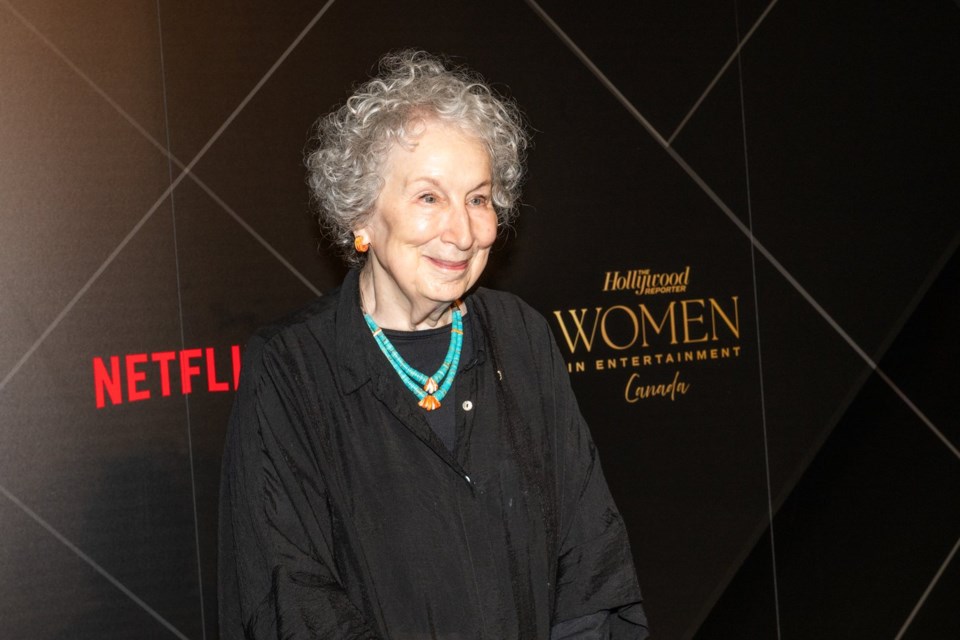TORONTO ã Margaret Atwood says it feels ãvery weirdã to see reality mirror ãThe Handmaidãs Taleã as the dystopian series comes to an end.
The show, adapted from the Canadian authorãs 1985 novel and filmed largely in and around Toronto, aired its final episode on Crave this week.
Starring Elisabeth Moss as June Osborne ã a woman forced into reproductive servitude under a brutal theocratic regime ã ãThe Handmaidãs Taleã is set in a totalitarian society that strips women of their rights and autonomy.
Since its debut, the series has often felt reflective of real-world politics, especially during Donald Trumpãs presidency. It premiered amid a growing cultural reckoning over reproductive rights and authoritarian rhetoric, and its imagery even bled into protest movements ã with women's rights activists donning red robes and white bonnets based on the show's costume design.
ãThatãs uncanny. Trump won the first time in 2016 when we were in the middle of shooting Season 1, and we all woke up the next day and said, ãWeãre in a different series,ãã Atwood said in Toronto on Thursday while in town to receive an honour at The Hollywood Reporterãs Women in Entertainment Canada Awards.
Although the script hadnãt changed, she said, ãthe frame changed, and people viewed it way differently than they would have if Hillary Clinton had won. If sheãd won, it wouldãve been, ãWe missed the bullet.ã But when he won, people were going, ãHere it comes.ãã
With Trump now back in office, Atwood reflected on the seriesã conclusion and the strange timing: ãItãs very weird. But weãll be launching 'The Testaments' Season 1 in less than a year, and thatãs weird too,ã she said, referring to the Hulu sequel series based on Atwoodãs 2019 novel.
ããThe Testamentsã takes place after ãThe Handmaidãs Tale,ã when a resistance is already building. As they do.ã
That sense of resistance also applies to the current political tension between Canada and the U.S., as growing anxieties over trade disputes and cultural sovereignty are bubbling to the surface ã and, in Atwoodãs view, reaching a level of urgency not seen in decades.
"Iãve seen that movie a couple of times, but under different circumstances,ã she says.
ãI think this is the most direct threat weãve had since the War of 1812.ã
The author notes Canada's had a renewed spirit of patriotism she hasn't witnessed in years.
"I know there's a degree of 'yay Canada' that I haven't seen since the 1980s. So it's very interesting for me, and quite new for a lot of young people. They're probably thinking, 'What just happened? What's going on? Is this real?'
Still, she says, Canadians shouldn't panic just yet.
"To cheer you up, the States and Canada are both members of (NATO)," she says, explaining that if the U.S. took any hostile action it would first have to exit the alliance, which would then have to defend Canada. "So how much of a world war do you want to get into?"
And while some Canadians are calling for homegrown artists to step up amid rising calls for cultural protectionism, Atwood believes true artistic expression canãt be forced.
"You can't order artists to do anything, and if you are ordering them and they're obeying you, they're just propaganda tools," she says.
"So let the artists rip, they'll make their own decisions, they will create their own things, and then you can decide what you think about them."
Ultimately, Atwood has cautious optimism about the publicãs ability to recognize warning signs before dystopian fiction becomes lived reality. "I donãt see people running around in red outfits with bonnets yet, so we still have hope," she says with a smile.
This report by The Canadian Press was first published May 29, 2025.
Alex Nino Gheciu, The Canadian Press


